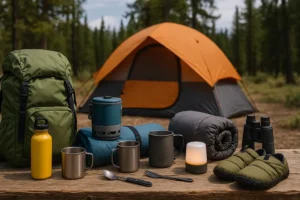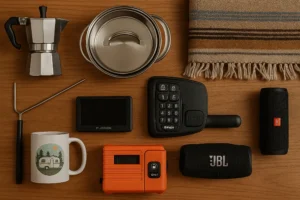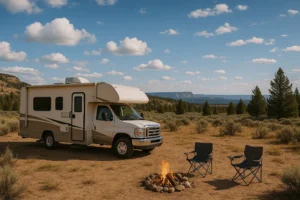If you rely on a CPAP machine, you already know how critical it is to get uninterrupted therapy each night. But what happens when you’re camping, traveling, or dealing with a power outage? That’s where a portable power station for CPAP becomes a game-changer. With the right setup, you can enjoy consistent, reliable sleep no matter where life takes you.
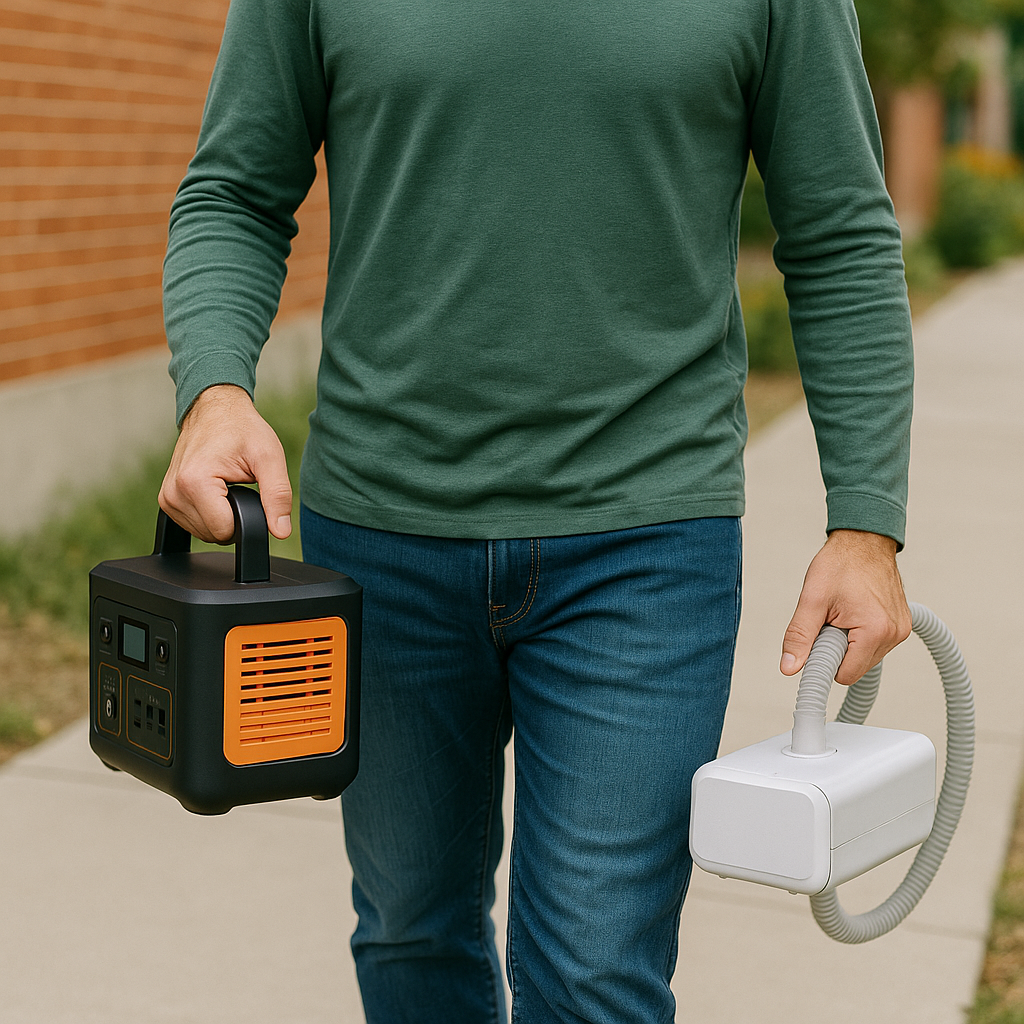
Let’s dive into everything you need to know—from calculating your CPAP’s power needs, to choosing the best portable power station, to practical tips that extend runtime.
How to Determine Your CPAP’s Power Needs
Before you shop for a portable power station, it’s essential to understand exactly how much energy your CPAP requires.
Checking Your CPAP’s Wattage
Most CPAP machines consume between 30 and 90 watts per hour. If you use extra features like a heated humidifier or heated tubing, the draw can spike to 120–150 watts per hour.
To find your machine’s wattage:
- Look at the label on your device (often near the power port).
- Check your user manual for power specifications.
- Search online using your model name.
Calculating Runtime
A standard night of sleep is about 8 hours. If your machine uses 50 watts per hour, you’ll need about 400Wh (watt-hours) of battery capacity to power it through the night.
The formula is simple:
Watts x Hours = Watt-hours needed
Example: 50W x 8 hours = 400Wh
That means a portable power station with at least 500Wh capacity should comfortably run your CPAP for a night, often longer if you adjust settings to conserve power.
Key Factors to Consider When Choosing a Portable Power Station for CPAP
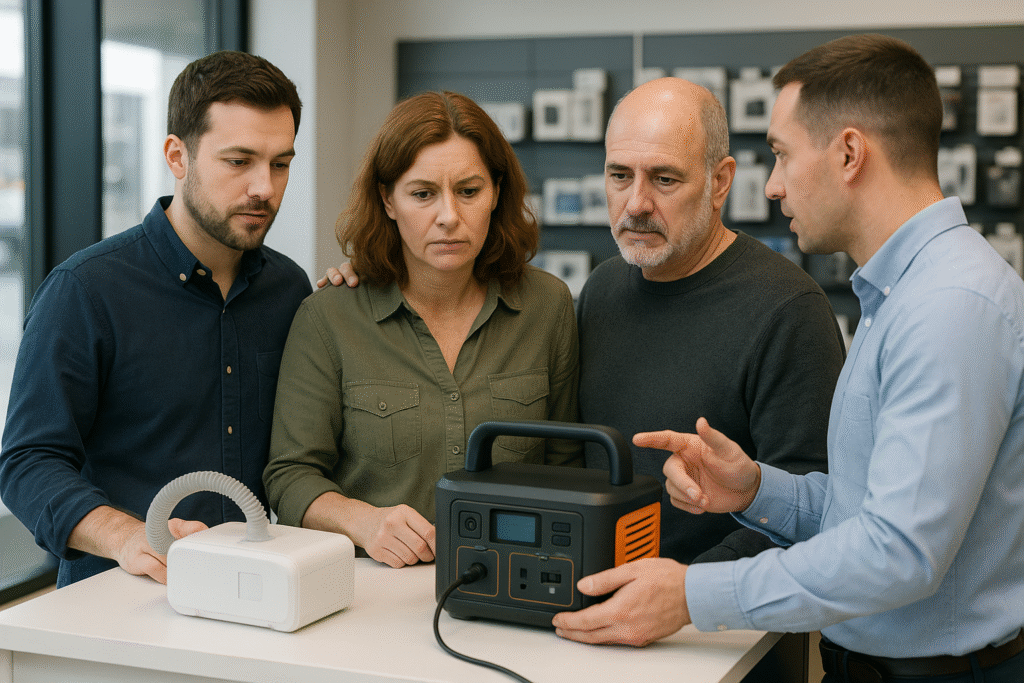
Not all power stations are created equal. Here’s what matters most for CPAP compatibility.
Pure Sine Wave Output
Your CPAP is a sensitive medical device. It needs clean, stable power—something known as a pure sine wave inverter. Without it, you risk malfunctions or even damage to the electronics. Always check that your power station is explicitly labeled pure sine wave.
Battery Capacity and Runtime
Choose your battery capacity based on how many nights you’ll need off-grid.
Portable power station categories:
- Ultralight (<15 lbs, under 300Wh): Good for one night.
- Lightweight (15–30 lbs, 300–1000Wh): Ideal for weekend trips.
- High-capacity (30+ lbs, 1000Wh+): Best for extended camping or home backup.
Outlet Types and Connectivity
Look for versatility. The best stations include:
- Standard AC outlet (110/120V) – works like a wall plug
- 12V DC port – more efficient for CPAPs (with correct adapter)
- USB-C ports – for phones and tablets
- Car adapter input – for recharging on the road
Portability and Weight
If you’re carrying your setup from the car to a campsite, portability matters. Handles, compact design, and even wheels (for larger units) make a difference.
Extra Features
Modern power stations include smart extras such as:
- Battery percentage and estimated runtime
- Input/output wattage displays
- App monitoring with Bluetooth
- UPS (Uninterruptible Power Supply) mode
- Temperature and safety alerts
Best Portable Power Stations for CPAP Machines
After reviewing specs, features, and user experiences, here are some top picks:
Bluetti AC60P – Best Overall
- Capacity: 504Wh
- Why it’s great: Compact, reliable, and efficient. Powers most CPAP machines through the night with room to spare. Recharge via wall, car, or solar panels. Quiet operation for bedside use.
Jackery Explorer 500 – Best Budget-Friendly Option
- Capacity: 518Wh
- Why it’s great: Affordable, lightweight, and easy to use. Multiple AC/DC ports and a pure sine wave inverter ensure CPAP safety. A solid choice for budget-conscious users.
EcoFlow RIVER 3 Plus – Best Lightweight Travel Option
- Capacity: ~300Wh
- Why it’s great: At just 15 lbs, it’s perfect for camping or flights where portability is key. Fast recharge times and flexible inputs keep it versatile.
Anker SOLIX F2600 – Best High-Capacity Choice
- Capacity: 2560Wh
- Why it’s great: Runs CPAP machines for several nights—even with humidifiers and heated hoses. Ideal for extended camping trips or reliable home backup during power outages.
Portable Power Station vs CPAP Battery vs Inverter Generator
You might wonder: should I just get a CPAP-specific battery or even a generator?
- CPAP-Specific Batteries: Lightweight and compact, but usually limited to 1–2 nights of use. Great for flights but less versatile overall.
- Inverter Generators: Reliable with fuel, but noisy, emit fumes, and not safe indoors. Better for outdoor-only setups.
- Portable Power Stations: The best balance of safety, versatility, and performance. Can be recharged with solar, wall outlets, or vehicles. Safe to use by your bedside.
Tips to Maximize CPAP Runtime on a Portable Power Station
Even the best battery can run down quickly if you don’t optimize your setup. Here’s how to stretch every watt-hour:
- Turn off the humidifier: The heating element drains power fast. Set humidity to 0 and leave the chamber empty.
- Switch to DC adapter: Running directly from 12V DC is more efficient than using AC with an inverter.
- Use unheated tubing: Heated hoses draw additional power—standard tubing saves energy.
- Enable airplane mode (if available): Cuts unnecessary wireless functions.
- Monitor settings: Don’t reduce therapeutic pressure, but adjust comfort features to conserve energy.
Real-World Example: Camping with a CPAP
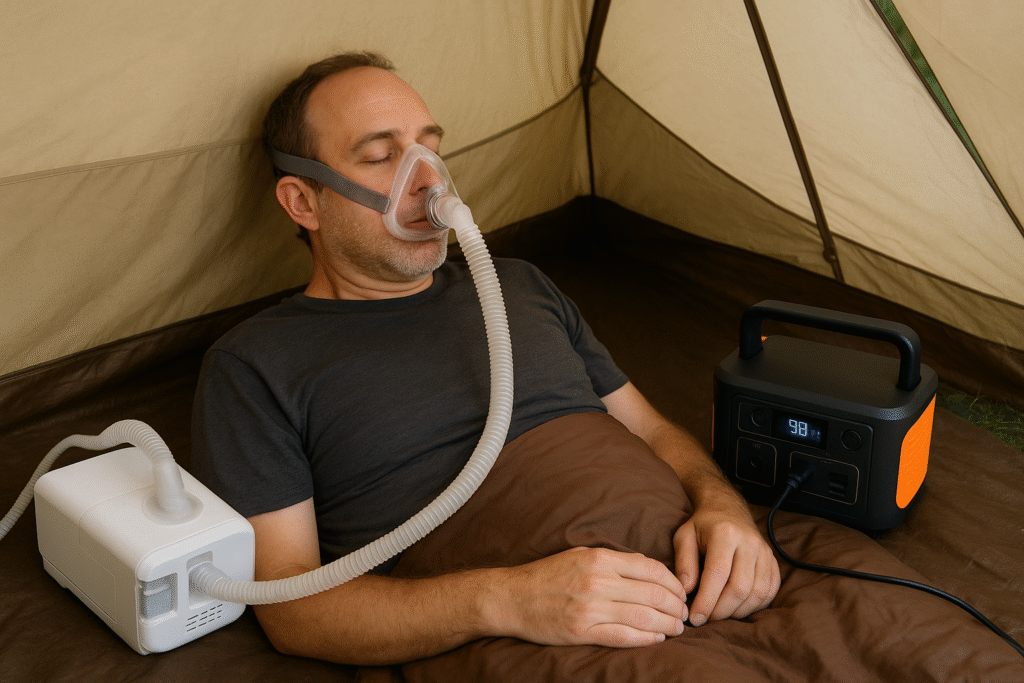
On a three-night camping trip using a Jackery 300 Plus, one CPAP user made key adjustments: humidifier off, standard tubing, and a DC adapter instead of AC. After three nights, the power station still had 52% battery left—enough for charging phones and lights.
This shows just how far small changes can extend your runtime.
Final Thoughts: Finding the Best Portable Power Station for CPAP
Choosing the right portable power station for CPAP comes down to balancing your needs for capacity, portability, and budget. Whether you’re heading off-grid for the weekend, preparing for emergency outages, or traveling internationally, there’s a reliable solution available.
If you prioritize compact design, go for something like the EcoFlow RIVER 3 Plus. For multiple nights off-grid, the Bluetti AC60P or Jackery Explorer 500 are solid choices. And if you want maximum peace of mind at home or on extended trips, a powerhouse like the Anker SOLIX F2600 is hard to beat.



